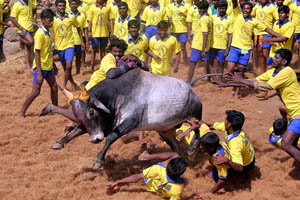New Delhi, Jan 12: The Supreme Court today stayed the Centre's notification lifting ban on controversial bull taming sport Jallikattu during the festival of Pongal in Tamil Nadu.

The bench also issued notice to the MoEF and Tamil Nadu on petitions filed by various bodies including Animal Welfare Board of India (AWBI) seeking striking down of the Centre's notification and sought their replies within four weeks.
Earlier during the day, a bench headed by Chief Justice T S Thakur referred the petitions to the present bench as one of the judges Justice Banumathi, who hails from Tamil Nadu, recused from hearing the batch of petitions.
The Centre's notification lifting ban on Jallikattu in Tamil Nadu was challenged in the Supreme Court yesterday by AWBI, People for Ethical Treatment of Animals (PETA) India and a Bangalore-based NGO.
The four-year-old ban on holding of Jallikattu was lifted on January 8 by the Modi government in poll-bound Tamil Nadu with certain restrictions.
The decision to allow Jallikattu along with bullock cart races in other parts of the country, had come through a government notification despite strong objections by animal rights groups.
Jallikattu also known Eruthazhuvuthal is a bull taming sport played in Tamil Nadu as a part of Pongal celebrations on Mattu Pongal day.
In its notification, the Centre had said, "...Central Government, hereby specifies that following animals shall not be exhibited or trained as performing animals with effect from the date of publication of this notification, namely bears, monkeys, tigers, panthers, lions and bulls."
"Provided that bulls may be continued to be exhibited or trained as a performing animal, at events such as Jallikattu in Tamil Nadu and bullock cart races in Maharashtra, Karnataka, Punjab, Haryana, Kerala and Gujarat in the manner by customs of any community or practiced traditionally," it had said.
However, the Centre had also put some conditions, saying bullock cart race shall be organised on a proper track, which shall not exceed two kilometres.
In case of Jallikattu, the moment the bull leaves the enclosure, it shall be tamed within a radial distance of 15 metres and it should also be ensured that bulls are put to proper testing by authorities of Animal Husbandry and Veterinary Department to ensure that they are in good physical condition to participate in the event.
Performance enhancement drugs are not to be administered to the bulls, the notification had said.
The use of bulls in performances was banned by the UPA government in 2011 on the ground that the sport ended in cruelty to the animals.







Comments
Add new comment